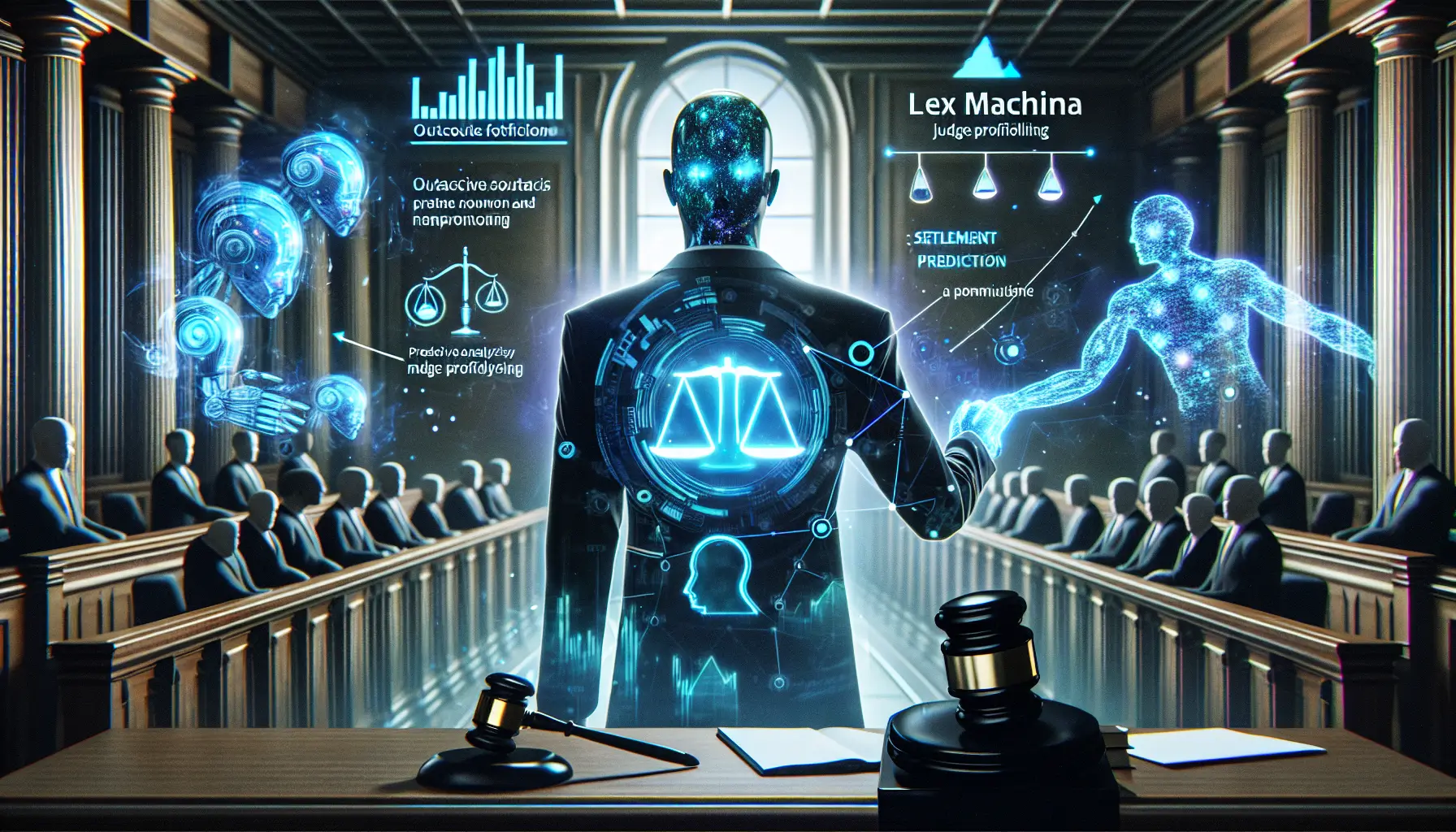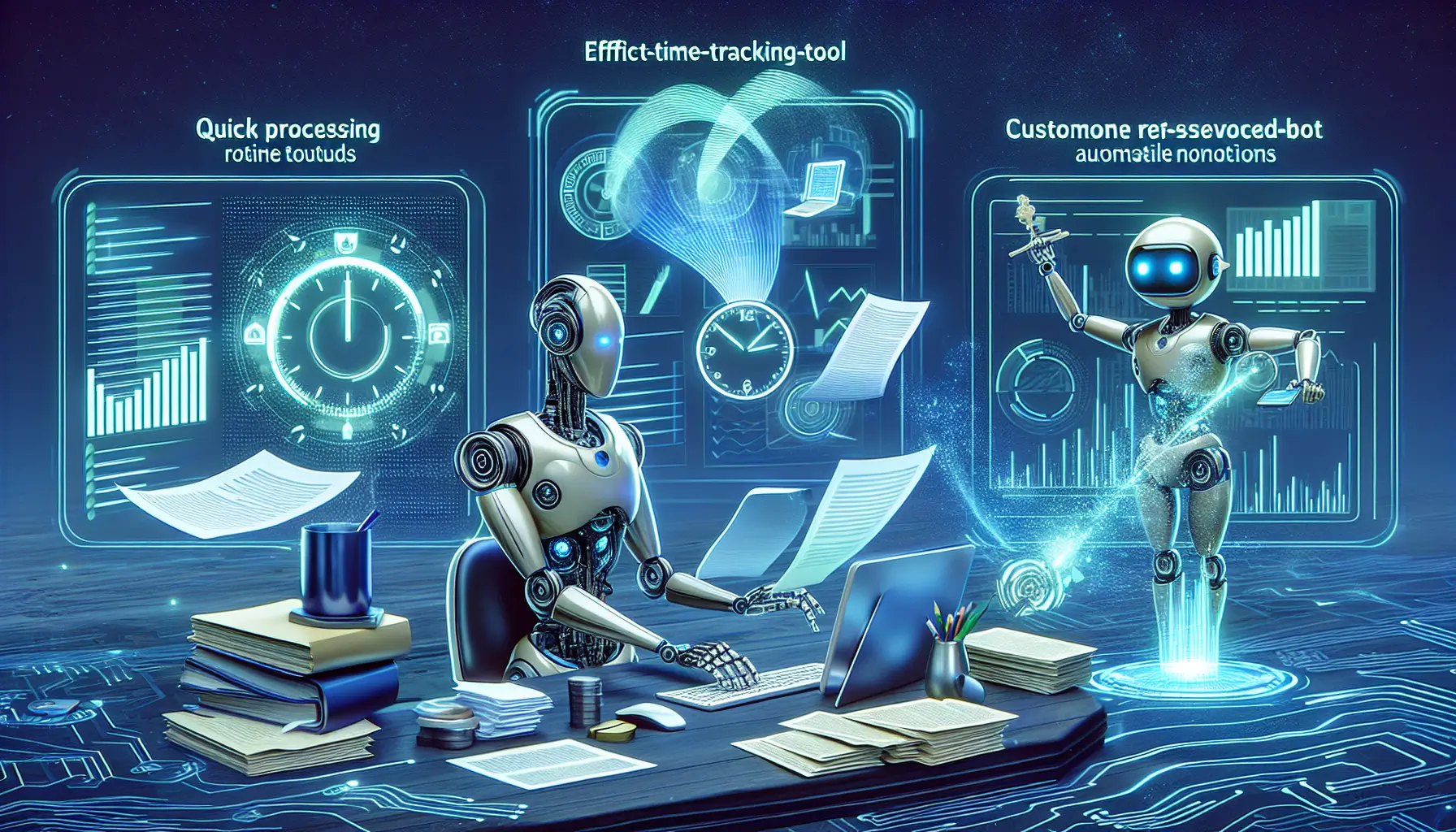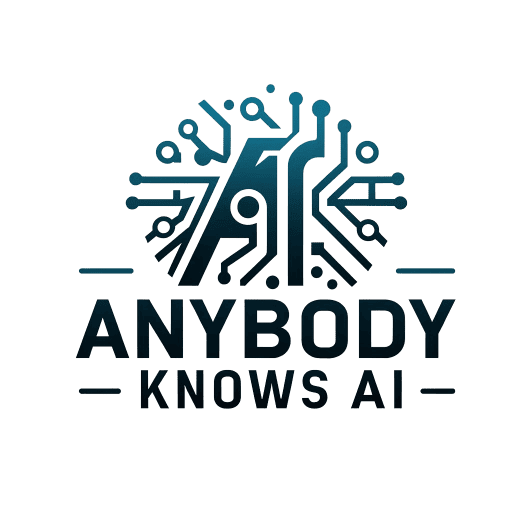Legal professionals leverage AI to streamline operations and gain strategic advantages in the legal tech landscape. This article highlights the top 5 AI applications in legal practice, addressing how cutting-edge technology optimizes research, contract review, document handling, litigation predictions, and client engagement without overwhelming detail.
Key Takeaways
- AI applications in legal practice substantially enhance efficiency and accuracy in legal research, contract review, document management, litigation strategy, and routine task automation, benefiting law firms and their clients.
- Predictive analytics AI tools transform litigation by providing attorneys with data-driven insights into trends, judge behaviors, and likely outcomes, enabling more informed strategic decisions and a competitive edge in court proceedings.
- Client service delivery in legal practices is evolving due to AI, which has tools for automating client interactions, improving time tracking and billing, managing relationships, and setting new standards for efficiency and client satisfaction.
AI-Enhanced Legal Research

The dawn of artificial intelligence in legal research has ushered in a new era for legal professionals, where the meticulous task of doing legal research platforms and sifting through extensive legal databases and lengthy legal documents is no longer a drain on resources and time.
With AI tools like OneLaw.ai and Casetext’s CARA AI, natural language processing (NLP) has empowered legal teams to interpret complex legal language and queries, delivering relevant case law and statutes with unprecedented speed and precision.
This technological leap has streamlined law firm operations and bolstered their more general legal data and expertise, reshaping the legal research process into a more sophisticated, error-resistant, and profitable function.
Advanced Case Law Analysis
Navigating the intricacies of case law is a foundational skill for any legal practitioner. AI tools for lawyers that have become indispensable allies include:
- Brief Analysis
- Casetext
- Blue J L&E
- Humata AI
These tools analyze legal strategies, predict case outcomes, refine legal arguments, and offer insights into procedural timelines and outcomes, ensuring a well-rounded approach to case preparation.
Adopting AI in case law analysis has been a game-changer, enabling lawyers to focus on crafting compelling legal arguments while leaving the heavy lifting to their digital counterparts.
Streamlined Statutory Research
Statutory research, once a labyrinthine task fraught with complexity and human error, is now a streamlined endeavor thanks to AI systems’ capability to traverse and interpret vast amounts of legal data rapidly.
Incorporating NLP has been a catalyst, empowering legal tools to discern the nuances within legal texts and ensuring that legal arguments are accurate and compliant with the latest regulations.
Law firms rely on AI for precision and staying abreast of regulatory changes in the legal industry that could significantly impact their legal service delivery.
Efficient Precedent Retrieval
The retrieval of relevant precedents and draft legal documents is now efficient, thanks to AI technologies like Casetext and OneLaw.ai. These tools provide summaries of complex legal documents, transforming legal jargon into understandable language and significantly expediting the legal research process.
Moreover, AI applications such as Detangle.ai and ChatGPT have made it easier for lawyers to quickly digest extensive legal texts and lengthy documents, ensuring they can swiftly find and apply the relevant information needed for their cases.
Smart Contract Review and Analysis

The intricate dance of contract review and analysis is now choreographed by AI tools like LawGeex, Harvey AI, and LegalRobot, AI technology, which bring a layer of sophistication to the due diligence process.
These tools meticulously comb through legal contracts to identify areas that demand attention, ensuring that every clause meets the stringent compliance and risk management standards.
The transformative impact of such AI-powered contract analysis on legal practices is profound, providing the foresight needed to navigate the potential pitfalls in legal contracts and safeguard the interests of law firms and their clients.
AI-Powered Contract Drafting
Drafting legal documents is no longer solely for the seasoned legal professional. AI-powered tools like TurboPatent, Legaly, and Amto have revolutionized this process, enabling the generation of legal contracts in a fraction of the time it once took.
These AI capabilities are not limited to document drafting alone; platforms like Motionize and PerfectNDA have been instrumental in streamlining the creation of specific legal documents, such as NDAs, considerably enhancing the speed and quality of legal work.
This frees up valuable time for legal teams to focus on more complex matters and ensures that the law firm’s operations are efficient and compliant with legal standards.
Risk Assessment Algorithms
The foresight provided by risk assessment algorithms is invaluable in today’s legal landscape. Tools like LawGeex and ThoughtRiver scrutinize legal documents with an eye for detail, uncovering potential risks that could jeopardize a firm’s regulatory compliance and contractual integrity.
By flagging these risks early, legal professionals can navigate the treacherous waters of legal contracts with the confidence that comes from having a robust risk management strategy, all thanks to the AI-driven insights that cut through the complexity of legal analysis.
Dynamic Clause Libraries
The advent of dynamic clause libraries marks a significant milestone in the evolution of contract automation. As AI continues to mature, tools under development, such as generative AI and large language models, promise to not only automate the drafting of contracts but also evolve with each review and adapt to nuanced requirements.
AI-driven contract lifecycle management systems that utilize dynamic clause libraries are changing the game by ensuring that contracts are accurate and tailored to specific legal needs, minimizing the risk of missing crucial clauses.
Intelligent Document Management Systems

Intelligent document management systems like Latch, eBrevia, and Relativity are the lighthouses guiding law firms to safe and efficient harbors in the vast ocean of legal documents.
These systems streamline the legal departments’ workflows and integrate cutting-edge features such as automated filing, secure access control, and collaboration tools, revolutionizing how legal documents are handled and safeguarded.
Automated Filing and Categorization
Amidst the deluge of legal documents, AI-driven document classification systems are a bulwark against inefficiency, enabling law firms to rize and file much larger documents than ever categories swiftly, swiftly extracting critical details from other legal documents, such as names, dates, and clauses, AI algorithms ensure that legal information is managed with the highest degree of accuracy and confidentiality, bolstering the integrity of legal data management.
Secure Document Access Control
In legal practice, where confidentiality is sacrosanct, AI-driven access control is a cornerstone of secure legal operations. Tools like Latch have been developed with the specific needs of law firms in mind, particularly those that manage vast arrays of contracts and sensitive information.
The integration of AI in managing permissions ensures that sensitive legal data remains under lock and key, accessible only to those with the authority to view it, thus upholding the rigorous standards of confidentiality that the legal profession demands.
Version Control and Collaboration Tools
In specialized legal areas such as patent law, the precision, and organization of version control and collaboration tools are indispensable. AI-driven applications like PatentPal and ANAQUA Studio are tailored to streamline the patent application document review process, saving legal teams countless hours and ensuring smooth and error-free collaborations.
The specific design of legal AI tools like ANAQUA Studio, a legal AI tool catering to the unique demands of patent drafting and prosecution, is a testament to AI’s capability to deliver targeted solutions across different legal fields.
Predictive Analytics in Litigation Strategy

As chess players of the courtroom, legal professionals can now harness the power of predictive analytics to gain insights into litigation trends and outcomes, giving them a competitive edge in legal battles. Tools like Lex Machina and Blue J L&E analyze case data and present it in a user-friendly manner that enables strategic decision-making and a proactive approach to litigation.
Outcome Forecasting
The realm of litigation is fraught with uncertainties, but AI tools like CoCounsel and Lex Machina provide legal firms with a beacon of predictability. By crafting legal arguments and identifying precedents, these tools assist law firms in forecasting outcomes and fine-tuning their litigation strategies, ensuring that their cases are grounded in data-driven insights.
The application of machine learning in class action litigation, in particular, demonstrates the AI’s prowess in quickly and efficiently analyzing court rulings and shaping the course of legal proceedings.
Judge and Opponent Profiling
Understanding judges’ tendencies and opponents’ litigation history is crucial in formulating a winning courtroom strategy. AI tools like Lex Machina are equipped to decode the behavioral patterns of judges, offering insights that can be leveraged to tailor legal strategies more effectively.
The data-driven profiling provided by AI enables attorneys to anticipate their opponent’s moves, drawing on past strategies and outcomes to secure an advantage in litigation.
Settlement Prediction
AI’s ability to predict settlement outcomes profoundly impacts the art of negotiation, empowering lawyers with the foresight needed to develop superior negotiation tactics. With tools like Lex Machina and Premonition, law firms are equipped to influence case resolutions, ensuring that they can advocate for their clients with a strategic edge that only AI can provide.
Automation of Routine Tasks and Client Interactions

The automation of routine tasks and client interactions has become one of the hallmarks of a modern law firm, with AI tools like Kira Systems, CaptureNow, and DoNotPay streamlining legal processes and enhancing client service delivery.
These advancements have improved the efficiency of legal technology workflows and reshaped how law firms interact with their clients, setting a new standard for legal services delivery.
Virtual Legal Assistants
Virtual legal assistants such as DoNotPay and ChatGPT are redefining client interactions, automating responses to legal inquiries with a speed and efficiency that was previously unimaginable. These AI chatbots provide quick and accurate assistance, offering legal information and process automation that enhances the client experience and allows law firms to manage a greater volume of inquiries easily.
Time Tracking and Billing Automation
The meticulous task of tracking billable hours has been revolutionized by AI applications like ClickUp, which offer advanced features specifically designed for the legal profession. With native time tracking and billable hours features, these tools facilitate accurate time management and streamline the billing process, reducing disputes and lowering administrative costs.
Enhanced Client Relationship Management
AI’s impact on client relationship management cannot be overstated, with tools like CaptureNow automating and refining the management of client interactions, thereby reducing manual processes and increasing overall efficiency.
The integration of such AI tools signals to clients the law firm’s commitment to technological advancement and exceptional service, further cementing the firm’s reputation as a forward-thinking leader in the legal sector.
Table summarizing the top 5 AI applications in legal practice, emphasizing their main features and uses:
| AI Application | Primary Use | Features |
|---|---|---|
| ClickUp Brain | Document drafting, case management | Drafts complex legal documents, manages project workflows, tracks billable hours, and enhances team communication. |
| Lawgeex | Contract review automation | Automates contract reviews per company guidelines offers analytics on contract review processes and integrates with CRM systems. |
| Amto | Drafting contracts and legal documents | Utilizes generative AI for creating consistent legal documents, provides recommendations for missing clauses, and automates reminders for clients. |
| Detangle.ai | Summarizing legal documents | Summarizes complex legal texts, converts jargon into plain English, supports multiple formats including audio and video, operates on a pay-per-summary model |
| TrademarkNow | Intellectual property management | Streamlines searches for patents and trademarks, ranks search results by relevance using AI algorithms, and offers efficiency in managing intellectual property records. |
These applications demonstrate a significant shift in legal practice, where AI assists with everything from document drafting to managing intellectual property more efficiently.
By automating routine tasks, these tools allow legal professionals to focus on more complex aspects of law, thus reshaping traditional workflows and potentially reducing the reliance on billable hours as the main business model.
Overview
Reflecting upon the AI revolution in the legal sector, it’s clear that law firms are experiencing a paradigm shift in how they conduct research, draft documents, manage data, forecast outcomes, and interact with clients.
The power of AI practice law is not just in its ability to handle complex legal issues but also in the value it adds to every facet of legal practice, from enhancing legal arguments to bolstering risk management and driving client satisfaction.
As law firms embrace these AI applications, they optimize their operations and position themselves at the forefront of innovation, ready to meet the challenges and opportunities of a rapidly evolving legal landscape.
Frequently Asked Questions
How does AI enhance the legal research process?
AI enhances legal research by using natural language processing and extensive legal databases to quickly find relevant case law and statutes, thus increasing efficiency and accuracy in conducting legal research. This is achieved through tools like OneLaw.ai and Casetext’s CARA AI.
Can AI tools predict the outcomes of legal cases?
AI tools like CoCounsel and Lex Machina use predictive analytics and machine learning to help lawyers forecast outcomes and refine their litigation strategies based on past case data and trends.
How do AI-powered contract drafting tools benefit law firms?
AI-powered contract drafting tools benefit law firms by automating drafting processes, improving document creation speed and quality, ensuring compliance, and allowing lawyers to focus more on higher-value, repetitive tasks. This frees up time and reduces manual errors.
What role do intelligent document management systems play in legal practices?
Intelligent legal document management systems like eBrevia and Relativity automate filing, categorization, and secure access control of legal documents, improving overall efficiency in legal practices.
In what ways do virtual legal assistants impact client interactions?
Virtual legal assistants, such as DoNotPay and ChatGPT, impact client interactions by automating responses to legal inquiries, leading to faster access to legal information and improved efficiency in managing larger volumes of inquiries. This enhances the overall client experience in interacting with law firms.







